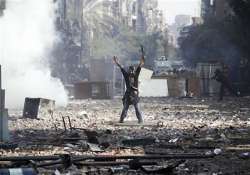Egypt's Military Rulers Apologise For Deaths Of Protesters
Cairo, Nov 24: Egypt's military rulers today apologised for deaths of protesters demanding civilian control and vowed to punish the culprits, amid a temporary ceasefire following fierce street battles that claimed at least 39 lives

Cairo, Nov 24: Egypt's military rulers today apologised for deaths of protesters demanding civilian control and vowed to punish the culprits, amid a temporary ceasefire following fierce street battles that claimed at least 39 lives and left over 3,000 people injured in six days of unrest.
“The Supreme Council of the Armed Forces (SCAF) presents its regrets and deep apologies for the deaths of martyrs from among Egypt's loyal sons during the recent events in Tahrir Square,” the military rulers said in a statement on their Facebook page.
“The Council also offers its condolences to the families of the martyrs across Egypt.”
SCAF also promised a swift investigation into the violence that killed 39 people and left more than 3,000 wounded in six days and prosecution of those responsible.
Overnight a truce, negotiated by Muslim clerics between protesters and police, halted violence, on the edge of the iconic Tahrir Square, the epicentre of public dissent. But, thousands of protesters were still there and there was little scope that the latest apology by military would pacify them.
The unrest, which began on Saturday, came days before the country's first parliamentary elections, scheduled to open on Monday, since President Hosni Mubarak was ousted in February following a popular uprising.
Protesters in several cities across Egypt have been demanding that the military rulers hand over power to civilians immediately. They have rejected a pledge to speed up transition to civilian rule and vowed to continue their protest until the military rulers step down.
The protests spread to other cities from Cairo. In Alexandria, Egypt's second-largest city, clashes erupted last night along a street near the main security directorate.
Riot police in Alexandria fired tear gas after the withdrawal of the army, which was deployed to oversee a prisoner release.
Besides Alexandria, clashes were reported from the city of Ismaili.
Despite the truce, there were reports that police from the Interior Ministry's Central Security Forces fired an unprovoked barrage of tear gas at a large crowd gathered on Mohamed Mahmoud Street here.
“Interior Ministry forces are out of control ... they're not being professional and they're not being controlled by the military council,” Rebab el-Mahdy, a politics professor at the American University in Cairo, told pan-Arab satellite channel Al-Jazeera.
Two members of the ruling military council appeared on state TV late last night to offer “condolences to the entire Egyptian people” following deaths of the protesters.
One of them, Maj Gen Muhammad al-Assar, extended “the regret and apology of the entire armed forces on the tragedy that occurred”.
For the first time they offered an apology from the entire armed forces and also appealed to Egyptians not to compare them with the former regime of Mubarak.
“We are completely different,” one of the Generals was quoted as saying by BBC. “We do not aspire to power and we do not want to continue in power.”
The military council is due to announce shortly how it plans to go ahead with the upcoming parliamentary elections.
The crisis began when riot police violently cleared a small encampment in Tahrir Square on Saturday. Protesters say the continued fighting has hardened their resolve to remove the military from power and complete a revolution that began in January against Mubarak's rule.
Field Marshall Hussein Tantawi had announced on state media on Tuesday that the military had no interest in staying in power and that parliamentary polls would go ahead as scheduled.
He also pledged that the presidential election would take place before July 2012, the first time the military has set a deadline for the vote.
The presidential election would mark the last step in a transition of power to civilian rule.
However, his address did little to pacify the protesters who refused to budge from their demand and stayed put at the Tahrir Square.